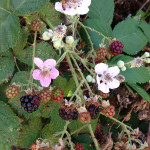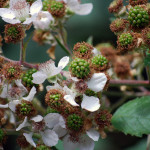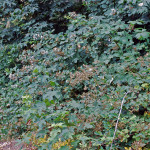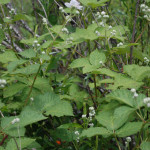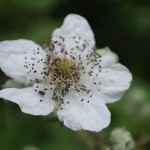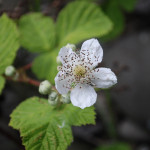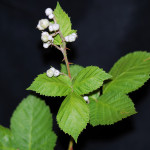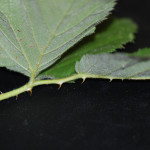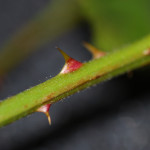Gallery:
- Fruiting blackberry
- Unripe Blackberry fruits
- Blackberry bramble
- Himalayan Blackberry
- White Blackberry flower
- Himalayan Blackberry
- blackberry leaves
- Blackberry thorns on underside of leaf
- Recursive Blackberry thorns
Common names:
Himalayan Blackberry, Armenian Blackberry
Scientific Name:
Rubus armeniacus (syns. Rubus bifrons, Rubus discolor, Rubus procerus)
Description:
Himalayan Blackberry is a tall semi-woody shrub, characterized by thorny stems and edible fruits. It grows upright on open ground and will climb over and trail over other vegetation. Mature plants can reach 15 feet in height. The canes of Himalayan blackberry can reach lengths of 40 feet and are typically green to deep red in color. Himalayan blackberry forms dense, nearly impenetrable thickets. In some instance, canes can reach densities of more than 500 canes per square yard. The canes of Himalayan blackberry typically last only three years before dying off, so dense thickets are often dominated by old canes.
Life cycle:
Height of mature plants
Up to 15 feet
Flower color:
White, Pink
Bloom time:
April to August.
Look-a-likes:
Cutleaf blackberry (Rubus lacinatus) is similar but has more deeply divided leaves.
Habitat:
The areas most infested by Himalayan blackberry are disturbed sites and along stream corridors. Blackberry flourishes on open ground, and on unmanaged sites. Plants grown in wet soils tend to be dense and more robust. Due to the movement by birds, Himalayan blackberry also is commonly found under perching sites, such as along fence rows and under power lines.
Impacts:
Himalayan blackberry is a highly invasive plant that replaces native vegetation. The canes of blackberry can build up substantial litter layer which may serve as fuels for wildfire. The thorns of the blackberry plants can limit the access of a site by both animals and people. While dense thickets can be useful to some wildlife species, the diversity of habitats is greatly diminished, thereby diminishing the usability of a site to only a few species.
Noxious Weed Listing:
- WeedWise: Maintenance
- State of Oregon: Class B
- State of Washington: Class C
- Four County CWMA: Class C
Origin:
Asia
Links:
Oregon Noxious Weed Profile
Washington Noxious Weed Profile
Invasive.org profile
CABI Invasive Species Compendium

